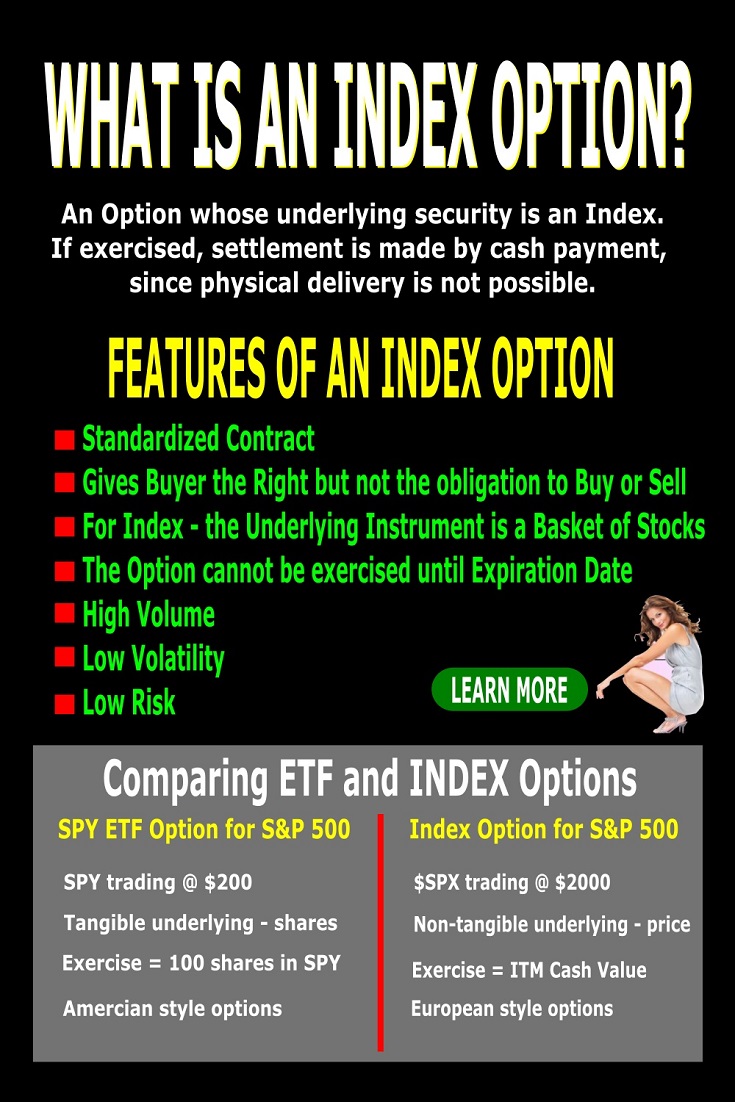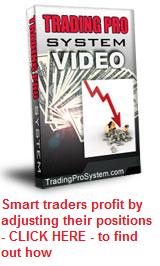Search Options Trading Mastery:
- Home
- Index Options
- What is an Index Option
What Is An Index Option
So what is an index option and how does it differ from other financial instruments? To answer this question, we need to set the background with a little bit of history.
Stock indexes have been around for a long time, the most notable of which is the Dow Jones Industrial Average (DJIA) which featured prominently in the infamous 1929 Wall Street Crash.
Indexes are nothing more than a weighted average of a basket of financial instruments such as shares or commodities. They are not publicly traded financial assets in themselves. No one can own an index like they do shares in a company.
There are many types of indexes. Some cover groups of stocks, others cover industry groups, currencies or commodities. Some are broad based, such as the Russell 3000 and the S&P 500, while others are more narrowly focused.
If you aspired to be a trader back in the mid 1970's, your primary form of investment would be to buy shares in individual companies in the hope that the price would rise so that you could sell them for a profit.
However, since that time, with the advance of technology and the proliferation of firms specializing in managing funds, a smorgasbord of new financial instruments have appeared.
The futures market has also been around for a long time, but in the early 1980's, stock index futures were introduced as tradable instruments. For the first time, traders could now speculate on the future direction of an index. As things progressed, options on index futures were offered ... and finally, options on the indexes themselves.
Unlike futures, options don't carry the same negative risk, because when you buy options, the most you can lose is the amount you've invested. Unlike futures, options carry rights but not obligations. This makes them an attractive investment vehicle.
So what is an index option? It is the right, but not the obligation, to the future financial value of a calculated number. If you own call options on an index and the number rises, you profit. If the index falls, put options will profit. Simple as that.
Because an index is not an asset in itself, there are some special conditions that come with index options. Index options are "cash settled". This means that you cannot exercise the options and receive the underlying asset, as you can with stock options.
The value of the options cannot be translated into assets so they must be settled for their cash value. You can buy or sell index options during any trading day but you cannot exercise them for their cash value until after the market has closed.
What is an Index Option useful for?
Well, you can use them to hedge a portfolio of shares against general market movements, or you can trade the options themselves.
One of the advantages of an index is, that unlike company shares, they are not so susceptible to overnight price gapping due to news events. This is because they cover a broad base of underlying stocks such that the price action of one individual company is unable to influence the value of the index as a whole.
This allows traders to hold their index options for longer periods with a greater degree of certainty about price movement.
What is an Index Option Compared to an ETF Option?
Exchange Traded Funds (ETFs) are a more recent invention. These are
companies whose shares are publicly traded, but their sole asset base is
comprised of a basket of stocks or futures that represent any given
index, or other market for that matter. As such, the price action of ETF
stocks correspond to the changing value of the index.
Since Exchange
Traded Funds are stocks that can be owned or traded, an investor can use
options on ETF stocks to achieve the same thing as if they were trading
index options themselves. Not only that, but ETF options are much
cheaper and consequently, attract a much greater open interest and daily
trading volume.
Trading options on ETFs in a particular way, form
a significant component of the popular Trading Pro System developed by
veteran trader David Vallieres.
For further reading, go to ETF Options where we have listed the most popular ones.
**************** ****************
Return to Index Options Contents Page
Go to Option Trading Homepage















New! Comments
Have your say about what you just read! Leave me a comment in the box below.